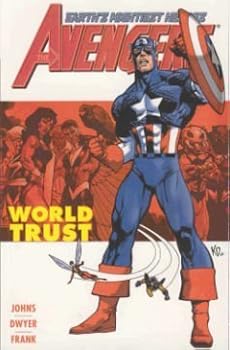(Or find the entire series here.)
 Reading Comics, Part 7: Trades, arcs, volumes
Reading Comics, Part 7: Trades, arcs, volumes
by Dr. Brad K. Hawley
In this week’s column, I need to clarify some terms and explain purchasing options so that you can understand the multiple ways comics are issued and reissued.
The first terms to be understood are trade, arc, and the two definitions of volume. Trades are collections of individual issues of comics that often form one or more story lines, or arcs. Most major comic series require multiple trade collections and are numbered in volumes, often seen on the spine of the trade collection. However, volume also refers to when a series started, and a series could be restarted multiple times.
I’ll be using The Avengers as an example today since the movie just came out. The Avengers title has had four volumes in terms of series. The first volume started in 1963. The second series (using series as a synonym for volume here) started in 1996 and would be referred to as Avengers, Volume 2 or Avengers (1996) or Avengers, Volume 2 (1996). The third option, obviously, is the clearest. There’s also Avengers, Volume 3 (1998) and Volume 4 (2010). Each volume starts over with Issue Number One, so this can be confusing when buying trade collections.
 To confuse things further, a story arc within one series, or volume, can be too long for a single trade collection. Avengers, Volume 1, “World Trust” is actually Avengers, Volume 3 (1998), Issues 57-62 and is the first of a five-part collection of trades. In this case, Volumes refers both to the series number (Volume 3) and the separate section in a particular series (Volume 1).
To confuse things further, a story arc within one series, or volume, can be too long for a single trade collection. Avengers, Volume 1, “World Trust” is actually Avengers, Volume 3 (1998), Issues 57-62 and is the first of a five-part collection of trades. In this case, Volumes refers both to the series number (Volume 3) and the separate section in a particular series (Volume 1).
Now that I have possibly confused you, go to Wikipedia and look up Avengers (I often type in comics after a comic book title when I do a search of any type to make sure I get to the correct place faster). Here’s where you find out how Wikipedia can truly be a good source (and usually reliable) when you start reading comics.
Once you get to the “Avengers” page in Wikipedia, scroll down to the bottom to “Collected Editions.” This section will make very clear everything I just said in the previous paragraphs. While it may not be true for all Wikipedia subjects, the fan base for comics is large, intelligent, and computer savvy, and for the most part, they keep Wikipedia up to date. For any title you are interested in, go there first. It also will help you avoid buying trade collections with repeated issues.
 For example, if you look up Gotham Central by Brubaker and Rucka on Wikipedia (one of my all-time favorite comics — Law and Order meets Gotham City), you’ll see that Gotham Central, Volume 1: “In the Line of Duty” TPB (trade paperback) collects issues #1-5 and that the new version of Gotham Central, Book One has the same title — “In the Line of Duty” — but collects issues #1-10. A quick check on Amazon will let you know that this second “In the Line of Duty” is now available in paperback as well. You’ll want to use the ISBN at this point to make sure you get the correct title.
For example, if you look up Gotham Central by Brubaker and Rucka on Wikipedia (one of my all-time favorite comics — Law and Order meets Gotham City), you’ll see that Gotham Central, Volume 1: “In the Line of Duty” TPB (trade paperback) collects issues #1-5 and that the new version of Gotham Central, Book One has the same title — “In the Line of Duty” — but collects issues #1-10. A quick check on Amazon will let you know that this second “In the Line of Duty” is now available in paperback as well. You’ll want to use the ISBN at this point to make sure you get the correct title.
By the way, when you have titles as confusing as these are, I would not risk a third-party purchase on Amazon’s marketplace or on eBay unless you are very careful. Amazon third-party sellers are required to sell you the exact same title listed and not the same ISBN listed. (This error can occur with any type of book: Many of my students in college classes end up with the wrong books because they rely on third party purchases of titles.) Next time, I’ll talk about great places to purchase, and get advice about, comics.
Next time: Part 8: Where to buy your comics



This is super helpful, Brad! Thanks!